
Written by Maia, President & Founder
A couple weeks ago, EWG broke the news that hexavalent chromium (aka the “Erin Brockovich chemical”) was present in the water of hundreds of millions of Americans. Otherwise known as chromium-6, there are no safe levels of this carcinogenic chemical, but there is a lot of confusion around what an acceptable level might be.
Even the terminology can be confusing–I am no math whiz, and struggled to make sense of parts-per-billion vs. micrograms-per-liter as I sifted through the research and scary news articles.
Of course, after seeing Erin Brockovich when I was in college, I sort of assumed that the chromium-6 problem had been cleared up decades ago. Unfortunately, it wasn’t.
What You Need to Know About Hexavalent Chromium (Chromium-6)
So here’s the bottom line on this toxin:
- Chromium-6 is really bad stuff–a well-established carcinogen.
- California has set a maximum legal level of 10 micrograms per liter of chromium-6 (this translates to roughly ten part per billion (10ppb)). This California level is the most stringent anywhere, but they’ve set the more ambitious public health goal of .02ppb. The EPA, by the way, lacks a specific limit for chromium-6, but has set a standard of 100ppb for all forms of chromium.
- Some level of chromium-6 may be in the drinking water of two-thirds of Americans. While this is the news grabbing headlines, it’s worth noting that only 2 percent of Americans’ drinking water contains levels above 10ppb, which is still some seven million people. (You can check your area here.)
- We should all be filtering our water for chromium-6, as well as many other toxins, such as chlorine, lead, pharmaceuticals, and more. (Here’s how to choose the right filter.)
 Does Your Filter Remove Chromium-6?
Does Your Filter Remove Chromium-6?
We’ve been getting lots of emails and calls from those of you who have purchased water filter systems through our store. You’re understandably worried about chromium-6, and wondering if your filter is useful against chromium-6.
Good news: The KDF/GAC filters in our store indeed capture chromium hexavalent. Whew!
The testing data shows that when water passes through our filter system, the chromium-6 is reduced by at least 90 percent. In my case, this means that my New York City water, which is estimated to contain .04ppb of chromium-6, should be reduced down to .004ppb.
When water spiked with high levels of chromium-6 goes through these filters, those levels drop to exactly the same level as the California law requires. This is great, but I was happy to discover that the testing is done on filters that have already filtered 20,000 gallons of water. In other words, because we recommend that those filters be replaced after about 5,000 gallons (every year or two), the filters that were tested should have been discarded years ago, but were still functioning very well, even with large amounts of chromium-6 dumped into them. This means that if you live in an area already below California’s legal limit for chromium-6 (as 98 percent of you do), and if you replace your filter every year or so, your exposure to chromium-6 via your drinking water should be negligible–at least 90 percent lower than the unfiltered water in your area.
If you are using a different water filter, you should definitely contact the manufacturer to be sure it is reducing the chromium-6 level down to 10 micrograms per liter or less, and ideally down below .02ppb.
Please feel free to post any questions below.
Stay sane,

If you liked this post, sign up for our newsletter to be alerted when we publish new content like this!

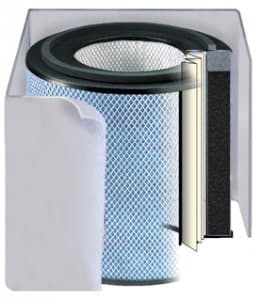
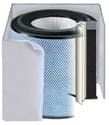 Does Your Filter Remove Chromium-6?
Does Your Filter Remove Chromium-6?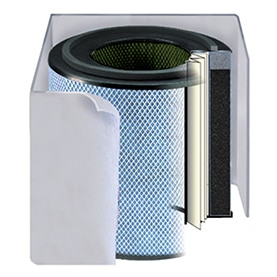

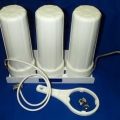
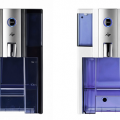

Victoria says
Hi, right now I am living with my mother-in-law and we are unable to use the water filters in your store. I have a 17 month old so healthy water is a priority for me. We were drinking Poland Spring bottled water, but we are currently using Nestle Pure Life or Penta for the baby. I know the concerns with that, so wondering if there is an alternative. I believe you recommended a filtering water pitcher before Do you still recommend this? Do you mind telling me what the name of it was? Thank you so much for your dedication to good health and safe living. I appreciate all you do.
John Goss says
Hi Victoria,
John here…
I’d like to know more about your situation and why a filter system will not work for you. We do have a countertop version that hooks directly onto your the end of your faucet that works very well.
W are not big fans of pitcher type filters for several reasons but if that is your only option they are better than nothing.
Feel free to contact me and I can give you more detail.
john@gimmethegoodstuff.org
I. Gutierrez says
Hello, I recently purchased a berkey water filter for my home and after reading about Chromium-6. Have you heard of this filtration system? If so what are your thoughts?
John Goss says
We have looked into Berkley several times and they make a decent system. We do not feel that they are as efficient or thorough as other systems but for a countertop, drip type filter they are better than most. They can be costly and require more cleaning than other types of filter systems. It appears that outfitted with the black filters they will remove chromium 6.
Mary says
Do we need to be concerned about this if using well water? Thx!
John Goss says
Hi Mary,
John here…
Great question!
The short answer is YES! In fact wells are where the higher concentrations of chromium 6 were first discovered. This does not mean that your well water is contaminated but it is worth filtering well water just in case. In fact well water is often subjected to many more pollutants than municipal water.
We offer specific filters for well water that are a bit different than the ones we recommend for municipal water.
Feel free to contact me directly at john@gimmethegoodstuff.org and I’ll be happy to guide you.
Best,
John
Muneer says
I am looking to purchase a RO system from my house and would appreciate if you could guide me which brand I should go with:
1) Whirlpool UltraEase RO
2) Krystal Pure KR10
3) BRITA Redi-Twist RO
4) Pure Blue H2O 4 Stage RO
Thanks.
John Goss says
Hi Muneer,
On our website we do not offer RO systems because the vast majority of folks do not need that sort of filtration. Our supplier has great RO systems.
RO systems have their drawbacks, but if you feel that RO is right for you, we can get you a very high-quality RO system.
Feel free to contact me directly at john@gimmethegoodstuff.org and I can give you more info.
Best,
John
carri says
Hello, is there anyway of having this water system that takes out the minerals? Thank you , Carri
John Goss says
Hi Carri,
While dissolved minerals are often considered beneficial, some folks have reason to want to remove them.
Reverse Osmosis (RO) filters can remove up to 95% of dissolved minerals. Although we don’t feature RO systems on our website, our builder can supply us with the filter systems you see on our site but with a great RO filter added.
This then gives you all the filtration to remove chlorine, lead, chromium 6 and many other toxins and also filter for minerals.
If you think you might be interested in such a system feel free to email me directly for more information.
john@gimmethegoodstuff.org
Best,
John
Jane says
Hi Maia! Thank your for introducing me to Hexavalent Chromium (Chromium-6). I completely have no idea what it is. This is a must-read. That list of things that needed to know about it are really helpful. Great post!
Silver says
Does counter top filter system connect to pull down type faucets. Do you have any adapters for that?
John goss says
Unfortunately nobody makes a filter for the more modern pull-down type faucets!!! No adapters either!!
The only solution is to use an under counter filter but that requires having an extra hole in your sins or countertop. If there is a hole for a soap dispenser, that will work. Also, it is not as difficult as you might think to make such a hole…even through granite!
Contact me at john@gimmethegoodstuff.org
Adrienne J. Sanchez says
Hey informative stuff, not sure if I read correctly but you stated 1 mg/L = 1 ppb however I believe the conversion is 1 mg/L = 1 ppm = 1000 ppb. The limit from Chromium 6 set by California would then translate to 10 mg/L = 10 ppm = 10,000 ppb.
Maia James says
good catch! I had it right a couple places, but I see the typo you noticed, where I said “one” instead of “ten.” Thanks!
mallory says
Is there anything like this to be used for the fridge?
reanna says
Hi,
How were your filters tested? By whom? Can we see the testing data? Thank you!